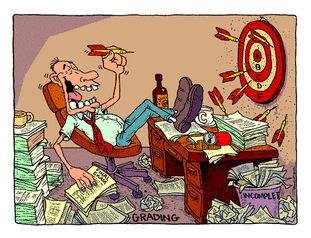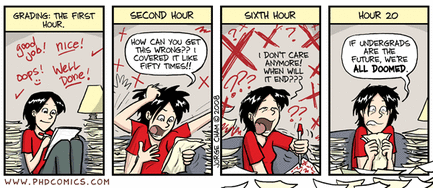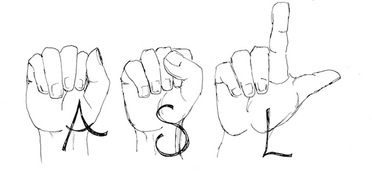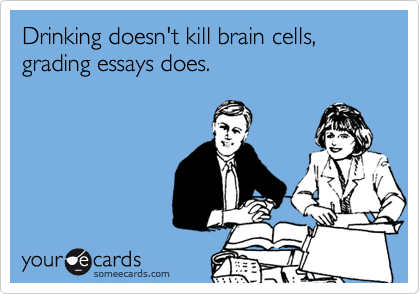|
After a few months of studying the interior of composition classrooms and it’s comprised teaching strategies through the many years, our class has never come across an article that addresses the composition classroom composed of deaf students. [The ListServ asks:] “Is anyone familiar with a first-semester writing course taught for ASL-speaking students or the same course for hearing-impaired students (as a section, not simply with accommodations within a standard course)?” – Bruce Martin, Lone Star College The field of composition is going through an identity crisis, always changing and adding more to it’s discipline as we discover more and more about the development of writing. A lot of questions are asked and observed but many are left unanswered. ASL, clearly is now added as a representation of a lost identity in the field of composition. The first response Martin received was “I have never explored this question but it reminds me of great works of a writing minor.” ----I’m sorry but what kind of answer is that. As diversity in classrooms populate so won’t ASL and ESL and other disabilities that can alter the world of writing. We need more composition classes to accommodate all. Although it's not heavily explored in the field, I do not want anyone to be mistaken that it does not exist. Below is a video of an ASL class using their language at large! Watch and explore ASL!
0 Comments
 Going into the field of English education, I find that grading writing has to be oe of the most challenging aspects of a teacher's career. There are no classes that offer education majors the opportunity to learn how to grade and what we should expect from a student's performance. It is understood that each teacher has their own specific way to grade writing - whether they become known as the stickler teacher that harshly grades or the teacher that gives an A for any piece of work. I have found that I am not alone in this academic struggle. WPA ListServ scholars also worry about the grading process and how to provide excellent grading that will help students excel in their writing. I don't want to become a teacher that grades in a counterproductive manner. I want to ensure that my students receive grading that will enrich their writing, not hinder it, and find conventional ways to stay static on the way that I grade. In our writing composition senior seminar, we have discussed the importance of the authentic voice in student writing. A plethora of pedagogies aim to encourage student writing, while also aiding students to find their own voice through writing. So my question is, how do we, as teachers, provide grading that will effectively produce better writing?  Fortunately, it seems, that professors of first year writing courses can be fluid in the way that they grade essays. Every semester is a different opportunity to correct past mistakes and create a better way to grade essays. Professor Inoue, from California State University, states, "I think, our job is to set up conditions that allow that exploration to happen, at least in the writing classroom. When WE give grades on individual writing performances, we trick many students into not asking these questions about how to value writing and how they should understand their own writing." Professor Inoue argues that professors need to focus more on creating a conversation with a student about writing to help them understand what it is that they are lacking in their writing. This approach creates an environment where students will understand their writing goals and what they need to target when writing. It also soothes the criticism that may come from grading - it provides an environment of understanding writing and it's importance. This same professor has used a grading system known as "contracts." Although I do not fully understand what a contract for grading is, I assume, from the way he writes about it, that a contract is a standard created for students in the classroom that help them find ways to aim their writing objectives in a manner that will improve their writing, while also targeting the necessities to improve their grades. Many scholars that have commented on the thread geared towards grading essays have provided their own methods when it comes to the grading process, which all prove to work well in their classrooms. In an effort to apply what I have read to my future classroom, I have concluded a couple of key components when it comes to grading: 1) always give feedback and leave time for conversation about how a student may improve their writing 2) contracts or rubrics can assist a student that is struggling with identifying how to write well and 3) grading is a process of trial-and-error; there is no perfect way to grade.
In class, we talked about the impact that technology has on our writing, and what it makes available for us to do. I think this involves your selection of apps--do you just use your phone for texting, Facebook, and email? Or do you like to use tools on it? I find the best apps for me, as a user, a writer, student, and reader, are tools: Dictionary apps, Google search bars, etc. And this app is just that! Sometimes I think we're too negative about technology in a classroom setting. That using your tablet and phone for help is only a distraction, when really it could help you out a lot...if you use the right apps, and use them often. If you check Facebook a ton, you tap the Facebook app nearly every time you unlock your screen by habit. (Or whatever you use, I've heard Facebook is now getting outdated or whatever). But if you use your tools often, like your tip calculator, dictionary, and weather app, you become accustomed to using them when you need to! This app has a lot of helpful resources on it, as shown in its demo youtube video: This reminds me of the little pocket books that no one actually puts in their pocket. Or the Strunk and White "Elements of Style" book that some of us are notorious for carrying around and studying often during our college years. You become accustomed to using these things just like you would an app. I don't travel anywhere academically without Strunk and White. Its the same thing with our apps!
You use apps useful to you. As writers, this app has proven to help in all areas of writing, being writers, reading, etc. I don't see why "dependency" on apps is frowned upon, when we're the same way about some of our trusty books. Maybe not your first year writing MLA guide, but one of your MLA guides or sites you probably use often. And a dictionary. Apps can be just as helpful, if not more helpful, in these situations when you need to check to see if you're doing the right thing in your writing, and if you need help with it. I am actually in the process of downloading this app now to give it a try. But like we talked about technology in class, I get frustrated when I hear a college with a "laptop initiative" allow professors to completely ban internet use. Or when I hear that we cannot use our tools. While some students take advantage of class time to cruise the web, some also legitimately use the time for their work and research. And the age old tale tells, you need to accept change in life, even if you don't like it. You can tell students not to use things in your class. But whether or not they use apps on their work versus paper back dictionaries and guides is up to them, since its their style they are developing. To the creator of this app, I'd welcome feedback and input. I am excited to try it! Thank you. -Jenn |

Blog493This blog is a reactionary overview of the daily posts to the Writing Program Administrator's listserv. One day; one blogger; lots of reactions. Archives
May 2014
Categories |


 RSS Feed
RSS Feed